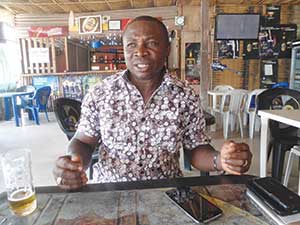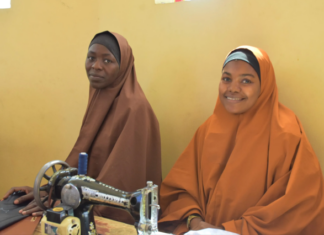After 35 five years of service, Hamis Okunbor retired from the Navy in 2012 as a Commodore (equivalent to a Brigadier General in the Army) to face a civil life that often leaves his colleagues like fish out of water.
Three years on, he has put his entrepreneurial knowledge to practical test. He presides over a popular relaxation spot, Fish Plus, and a sprawling fish farm that supplies fish demand at the centre.
Both ventures, situated closely by on two plots in Igbo-Elerin, in the Okokomaiko area of Lagos, are not only businesses Okunbor is pursuing. He is developing Halemson Beach Resort and a hospitality project, which is stalled for a lack of funds.
“What I am basically doing there is like building a beach estate. So, anybody interested to have a beach house could come and take a space there and we will build a beach house for him. It becomes his own,” he explained.
Principle for successful business venture
“I am using effectively a guiding principle I have learnt from my wife. She told me one day that little is much when God is involved. So, if you have little and God is with you and at the centre of your activities, you manage it properly.
“It is working; I have seen it. Those are the things that will count in the future. You may have N100 million, N500 million but down the line in five years, if it is not properly managed, you may just be asking colleagues and friends for financial assistance.
“And since I left the service, God has really been with me. Gradually, we have been taking it step by step and we are moving on.
“I have also learnt from the books I have read that it is not really the amount of money that you were able to accumulate while in service that really matters.
“It is how you are able to convert your ideas that really matters. Whatever amount of money you have brought out of service, if you have no idea on how to utilise it, it is going to diminish sooner than you expect.”
From military high command to entrepreneurial jigsaw
Okunbor, who was once Administrative Head of NNS Aradu, came to the height of his military career when he was posted to the Nigerian Armed Forces Resettlement Centre (NAFRC) in 2010 as the second in command.
He had served in several capacities; at one time as Fleet Commander, Nigerian Navy, Eastern Command Fleet, Calabar.
He joined the military on January 4, 1978 and by 1979 was a student officer at the Nigerian Defence Academy.
He attended the Command and Staff College, Jaji and the National Defence College between 2007 and 2008, and in 2009 obtained a Master’s degree in strategy from the University of Ibadan.
While at the NAFRC, he was sent for training at the Lagos Business School (LBS), Ajah, Lagos, where he spent some months at the Entrepreneurship Development Centre. Thus Okunbor’s smooth transition from military high command to entrepreneurial jigsaw did not happen by change.
He had always looked ahead to the day he would retire, aware of several military officers who ran into a crisis after retirement. He thought deeply about life in retirement and prepared for it.
He said three things crossed his mind: He could do something in maritime, like shipping; go into farming, or engage in hospitality business.
With entrepreneurial expertise gained from LBS coupled with his parcel of land lying fallow, he went into fish farming.
Fish farming meets relaxation concept
The idea of Fish Plus occurred to him while he was building the fish farm. A couple had visited him while he was working on the farm and they had to wait. So, he thought about a combination of fish farming and relaxation spot where customers coming for fish could relax with drinks while waiting.
The idea struck him as curious.
Okunbor set up a relaxation spot about 100 metres away from the farm. This gave birth to Fish Plus, implying a customer wanting to buy fish can as well take some drinks, pepper soup, and other delicacies while waiting.
“All the while I was in service I didn’t have the opportunity to have a command appointment (a juicy appointment). I always thought of how to convert my one kobo to two until I was posted to the NAFRC, Oshodi.”
Enter Fish Plus
After developing the concept, Okunbor detached himself from the day to day management of the business. But he supervised it for a period of time to determine the potential turnover.
He then left it in the hands of a manager who makes returns based on agreed terms.
Delicacy vendors provide need menu and service at agreed monthly returns. However, Okunbor intervenes occasionally to ensure things are properly done.
The relaxation spot is open in the morning and does not close as long as fun seekers of different hues mill around.
Stiff competition in the area keeps operators sensitive to competitive prices. Fish pepper soup (point and kill), Nkwobi, dry fish, goat pepper soup, grilled chicken, and other delicacies are sold at affordable prices.
Okunbor said the business is not yielding profit at the moment but he is glad it generates enough returns to keep afloat, pay salaries of over 10 employees, bills and the multiple taxes rife in Lagos.
Fish farm experiments
The fish farm is as promising as the relaxation spot. It boasts multiple ponds for breeding different fish species and sizes, including fingerling.
Okunbor is currently doing a 90-day fish experiment to determine which fish can return good profit within the tenor of bank loans. He takes fingerling, grow them for 90 days, and sell them off.
“I am trying to work on that. If I can produce fish for 90 days and make some money, that means if I take a loan for 90 days, I should be able to turnover reasonable profit and pay back the loan.”
Fish grow between six and nine months before they are sold off. During that period, the farmer feeds them on foreign feeds for four months.
But Okunbor is thinking outside the box, which is take a 90-day loan, use it to grow the fish within the three months, sell, and pay back the loan.
The fish are placed on two months of foreign feed meals, and subsequently on local feed for the third and last month. The aim is to optimise gain and minimise cost.
The first batch is due in mid March, then he will determine the profit margin when he sells them off.
Impact of naira devaluation
Okunbor said the crashed naira value against the dollar in the foreign exchange (forex) market makes for a grim profit outlook such that fish producers must seek out ways to strike a balance in order to squeeze out profit.
“What we are doing at this time when the cost of dollar is so much is that we try to strike a balance: how you can use local feed without necessarily tampering so much with the growth of your fish. So, you try and strike a balance, that’s what we are doing right now.
“Fish meal is imported, we don’t manufacture it here. When the naira is dropping in value against the dollar, that’s where it affects fish farmers.
“If the fish producer doesn’t have the imported feed, it is going to affect his fish. If it does not grow up to big size, buyers won’t buy at a good price, which implies that input could be so much but there’s is little or no profit.”
He said if a fish farmer feeds his fingerling on imported feed for three or four months, he must be affected by naira fluctuations.
In his view, the best thing is for the government to ensure the naira is strong enough so that a few amount can buy enough dollars for importers to bring in sufficient feeds, and then farmers can buy cheap in the market and produce enough fish to sell.
“On the average, if you are producing about 1,000 fish up to table size, you’re going to spend N350,000. By the time they are due for sale, one fish can hit 1kg, and a 1kg of fish is selling for about N500.
“So, 1,000 fish will give you about N500,000. You would have made N150,000 if you spent N350,000 to feed them in three months.
“But if your cost is high, as it is likely going to be with imported feed bought at high dollar cost, at the end of the day you feed 1,000 fish with about N450,000 and sell at N500,000. You encounter loss.
“Again, if the bargaining power of the local buyer is not strong enough to buy your fish at N500 per kilogramme, you will be forced to bring down your price to make it affordable.
“And if you don’t sell when you are supposed to sell, you will spend more money on feed without selling at increased price. You will lose so much. Therefore, you will be forced to sell at a give away price.
“So, the huge differential between dollar and naira is not helping any farmer who has to buy imported feeds.”














